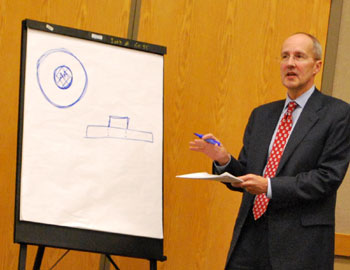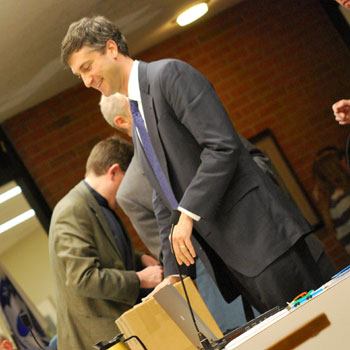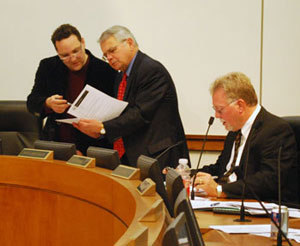Ann Arbor Transportation Authority special board meeting (Dec. 8, 2009): Late Tuesday afternoon at a special meeting, the AATA board heard from two consulting attorneys, as well as heads of three other Michigan transit authorities, on the subject of expanding the geographic scope of AATA service.

Jeff Ammon, a Grand Rapids area attorney who’s been consulting for the Ann Arbor Transportation Authority, explains legal options for establishing an entity that could expand the geographic reach of AATA service. Millage options use the metaphor of “donut” (upper left) and “layer cake” (middle right). (Photo by the writer.)
The meeting of the full board, with their five guests, came on the heels of a planning and development committee meeting. At that committee meeting Chris White, AATA’s manager of service development, gave highlights from a recently completed survey of Washtenaw County voters on their attitudes towards a possible countywide transportation tax.
Those who said they would “definitely” or “probably” vote yes on a 1 mill countywide millage eked out a 51% majority countywide.
However, Bob Foy, general manager of Flint’s Mass Transit Authority, repeatedly reminded the full board at their meeting: To get a millage passed, you need a product you can sell. In Flint, which is a countywide authority, Foy reported that the last millage was approved with 68% of the vote.
What the expanded transportation product might look like for Washtenaw County is not yet clear. At the planning and development meeting, AATA CEO Michael Ford indicated that AATA would be bringing in a consultant to address that issue.
The message sent at the board meeting by the two consulting attorneys – Jerry Lax and Jeff Ammon – was that there’s a difference between (i) deciding on the legal authority to be formed, and (ii) deciding on the desired service that AATA wanted to offer. When the board knew what countywide service it wanted to provide and how it wanted to fund that service, they said, at that point it would make sense to decide on the legal mechanism for establishing an expanded authority.
That authority could be established legally under either of the state’s enabling acts: Act 55 or Act 196. [Full Story]









